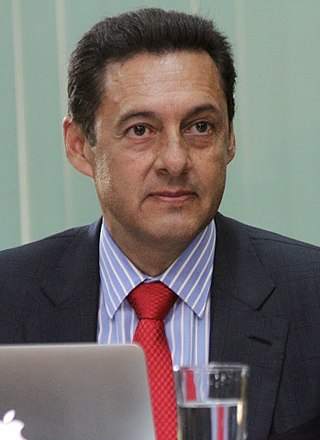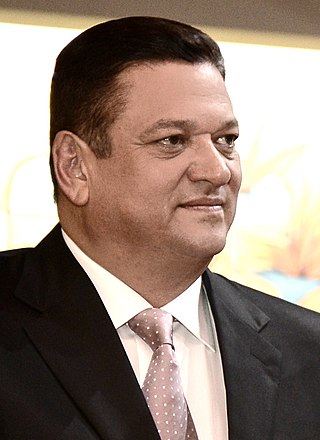
The politics of Costa Rica take place in a framework of a presidential, representative democratic republic, with a multi-party system. Executive power is exercised by the president and their cabinet, and the President of Costa Rica is both the head of state and head of government. Legislative power is vested in the Legislative Assembly. The president and 57 Legislative Assembly deputies are elected for four-year terms. The judiciary operates independently from the executive and the legislature, but is involved in the political process. Costa Rica has a strong system of constitutional checks and balances. Voting is compulsory de jure, but this is not enforced.
Nicaragua is a nation in Central America. It is located about midway between Mexico and Colombia, bordered by Honduras to the north and Costa Rica to the south. Nicaragua ranges from the Caribbean Sea on the nation's east coast, and the Pacific Ocean bordering the west. Nicaragua also possesses a series of islands and cays located in the Caribbean Sea.

Óscar Arias Sánchez is a Costa Rican activist and Nobel Peace Prize laureate. He was President of Costa Rica from 1986 to 1990 and from 2006 to 2010.

Rodrigo José Ramón Francisco de Jesús Carazo Odio served as President of Costa Rica from 8 May 1978 to 8 May 1982.

The National Liberation Party, nicknamed the verdiblancos, is a political party in Costa Rica. The party is a member of the Socialist International. Social-democratic by statute, the party has a few internal factions, including liberals, Third Way supporters, centrists, and social conservatives.

The Citizens' Action Party is a political party in Costa Rica.

General elections were held in Costa Rica on 5 February 2006. In the presidential election, Óscar Arias of the National Liberation Party, a former president and Nobel Peace Laureate, was victorious over Ottón Solís of the Citizens' Action Party and twelve other minor-party candidates. Although Arias was expected to win by a wide margin, the actual polling reports were unexpectedly close. However, early results showed the contest to be closer than it actually was. The preliminary official report, after 88.45% of the vote counted, showed the result for President of the Republic almost tied between Arias with 40.51% of the vote and Ottón Solís with 40.29%. Given the small difference of only 3250 votes, the Superior Electoral Tribunal announced that a manual count of all the votes would start immediately and no official winner would be announced until that process was completed, approximately two weeks after the election.

Antonio Álvarez Desanti is a Costa Rican politician, lawyer and businessman who has served twice as President of the Legislative Assembly. He was National Liberation Party candidate for the 2018 Costa Rican general election.

Johnny Francisco Araya Monge is a Costa Rican politician. He was the mayor of the country's capital San José from 1998 to 2013 and again since 2016. He was also the co-president of the United Cities and Local Governments (UCLG) from 2010 to 2013. He is a member of the National Liberation Party (PLN) and was a presidential candidate in the 2014 election.

Rolando Araya Monge is a Costa Rican politician. He is a nephew of former president Luis Alberto Monge.
Alberto Cañas Escalante was a politician, writer, intellectual, public servant, and journalist from San José, Costa Rica. He is known as one of the most important figures in the cultural, political, and social life of Costa Rica during the latter half of the twentieth century. The National Library System of Costa Rica credits Cañas with more than 4,773 publications as of 2005.

General elections were held in Costa Rica on 7 February 1982. Luis Alberto Monge of the National Liberation Party won the presidential election, whilst his party also won the parliamentary election. Voter turnout was 79%.

General elections were held in Costa Rica on 2 February 1986. Óscar Arias of the National Liberation Party won the presidential election, whilst his party also won the parliamentary election. Voter turnout was 82%.

General elections were held in Costa Rica on 4 February 1990. Rafael Ángel Calderón Fournier of the Social Christian Unity Party (PUSC) won the presidential election, whilst his party also won the parliamentary election. Voter turnout was 81.8%.
Juan Manuel Villasuso Estomba is a Costa Rican politician, writer and civil servant. He is a former member of the National Liberation Party and a current member of the Citizens' Action Party.

Juan Carlos Mendoza García is a Costa Rican politician and the country's current Ambassador to the United Nations. He was a deputy with the Citizens' Action Party during the 2010 to 2014 and served as President of the Legislative Assembly from 2011 to 2012.

A primary election was held among the members of Costa Rica's then ruling National Liberation Party (PLN) on June 7, 2009 in order to choose the PLN's nominee for presidency in the 2010 general election. The two main candidates for the nomination were then vice-president Laura Chinchilla and San José Mayor Johnny Araya. Former security minister Fernando Berrocal also ran a basically testimonial candidacy. PLN's main rival party, PAC, ran its own convention a month before.

A primary election was held among the members of Costa Rica’s National Liberation Party (PLN) on June 3, 2001 in order to choose PLN’s nominee for presidency in the 2002 general election. PLN was then the main opposition party facing then in government Social Christian Unity Party. This, as was common since the 70s, was an open primary and as such all Costa Ricans could vote in it with the only requirement be signing membership of the party moments before entering the polls.
Doris Yankelewitz Berger was a Costa Rican artist, politician, political activist, and member of the National Liberation Party (PLN). She served as the First Lady of Costa Rica from 1982 to 1986 during the presidency of her then-husband, President Luis Alberto Monge. She was the nation's first Jewish First Lady.

The Reform State or Reformist State is the period in 20th-century Costa Rican history when the country switched from the uncontrolled capitalism and laissez-faire approach of the Liberal State into a more economically progressive Welfare State. It began about 1940 during the presidency of social reformer Rafael Angel Calderón Guardia, and ended in the 1980s with the neoliberal reforms inherent in the Washington Consensus that began after the government of Luis Alberto Monge.














